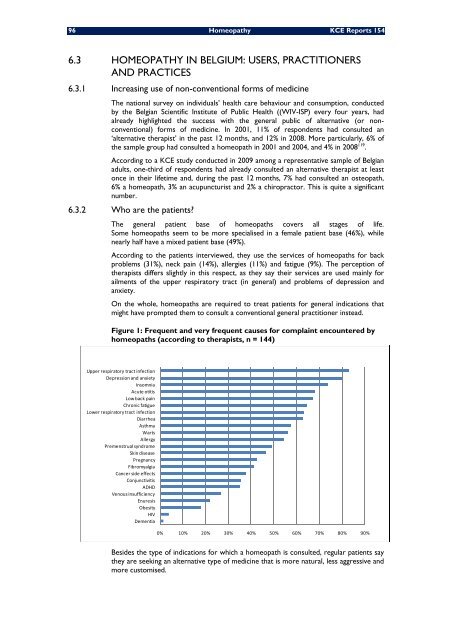Etat des lieux de l'homéopathie en Belgique - KCE
Etat des lieux de l'homéopathie en Belgique - KCE
Etat des lieux de l'homéopathie en Belgique - KCE
Create successful ePaper yourself
Turn your PDF publications into a flip-book with our unique Google optimized e-Paper software.
96 Homeopathy <strong>KCE</strong> Reports 154<br />
6.3 HOMEOPATHY IN BELGIUM: USERS, PRACTITIONERS<br />
AND PRACTICES<br />
6.3.1 Increasing use of non-conv<strong>en</strong>tional forms of medicine<br />
The national survey on individuals’ health care behaviour and consumption, conducted<br />
by the Belgian Sci<strong>en</strong>tific Institute of Public Health ((WIV-ISP) every four years, had<br />
already highlighted the success with the g<strong>en</strong>eral public of alternative (or nonconv<strong>en</strong>tional)<br />
forms of medicine. In 2001, 11% of respon<strong>de</strong>nts had consulted an<br />
‘alternative therapist’ in the past 12 months, and 12% in 2008. More particularly, 6% of<br />
the sample group had consulted a homeopath in 2001 and 2004, and 4% in 2008 119 .<br />
According to a <strong>KCE</strong> study conducted in 2009 among a repres<strong>en</strong>tative sample of Belgian<br />
adults, one-third of respon<strong>de</strong>nts had already consulted an alternative therapist at least<br />
once in their lifetime and, during the past 12 months, 7% had consulted an osteopath,<br />
6% a homeopath, 3% an acupuncturist and 2% a chiropractor. This is quite a significant<br />
number.<br />
6.3.2 Who are the pati<strong>en</strong>ts?<br />
The g<strong>en</strong>eral pati<strong>en</strong>t base of homeopaths covers all stages of life.<br />
Some homeopaths seem to be more specialised in a female pati<strong>en</strong>t base (46%), while<br />
nearly half have a mixed pati<strong>en</strong>t base (49%).<br />
According to the pati<strong>en</strong>ts interviewed, they use the services of homeopaths for back<br />
problems (31%), neck pain (14%), allergies (11%) and fatigue (9%). The perception of<br />
therapists differs slightly in this respect, as they say their services are used mainly for<br />
ailm<strong>en</strong>ts of the upper respiratory tract (in g<strong>en</strong>eral) and problems of <strong>de</strong>pression and<br />
anxiety.<br />
On the whole, homeopaths are required to treat pati<strong>en</strong>ts for g<strong>en</strong>eral indications that<br />
might have prompted them to consult a conv<strong>en</strong>tional g<strong>en</strong>eral practitioner instead.<br />
Figure 1: Frequ<strong>en</strong>t and very frequ<strong>en</strong>t causes for complaint <strong>en</strong>countered by<br />
homeopaths (according to therapists, n = 144)<br />
Upper respiratory tract infection<br />
Depression and anxiety<br />
Insomnia<br />
Acute otitis<br />
Low back pain<br />
Chronic fatigue<br />
Lower respiratory tract infection<br />
Diarrhea<br />
Asthma<br />
Warts<br />
Allergy<br />
Prem<strong>en</strong>strual syndrome<br />
Skin disease<br />
Pregnancy<br />
Fibromyalgia<br />
Cancer si<strong>de</strong> effects<br />
Conjunctivitis<br />
ADHD<br />
V<strong>en</strong>ous insuffici<strong>en</strong>cy<br />
Enuresis<br />
Obesity<br />
HIV<br />
Dem<strong>en</strong>tia<br />
0% 10% 20% 30% 40% 50% 60% 70% 80% 90%<br />
Besi<strong><strong>de</strong>s</strong> the type of indications for which a homeopath is consulted, regular pati<strong>en</strong>ts say<br />
they are seeking an alternative type of medicine that is more natural, less aggressive and<br />
more customised.

















